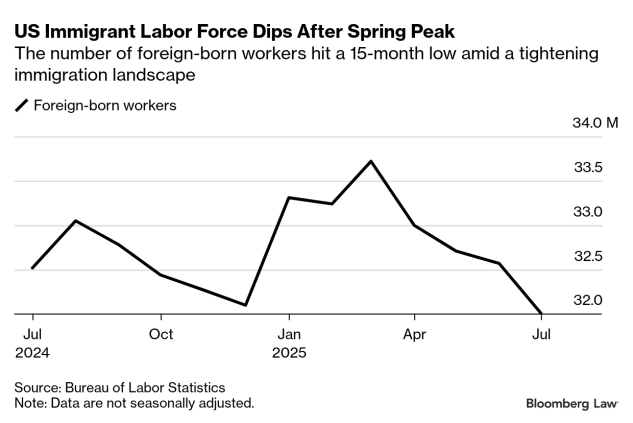Companies are increasingly worried about civil penalties, criminal investigations, and worker shortages as a spike in immigration enforcement funding stokes fears of more deportations and fewer available visas.
That’s the picture that emerges from more than two-dozen annual or quarterly filings companies made over the past month, warning that changes in immigration policies, or increased enforcement of existing ones, threaten to squeeze hiring of highly specialized workers in science and technology, as well as service-level workers for food delivery and rideshare.
Work authorization audits and raids have already ticked up, said Chris Thomas, partner at Holland & Hart LLP’s immigration law practice. Companies are braced for that to intensify: Thanks to President Donald Trump’s spending bill, the Department of Homeland Security has $165 billion to ramp up enforcement in the second half of the year and beyond, he said.
Many companies had been watching and worrying about the labor impact of an immigration crackdown for years. At least three new players—
Immigration policy compliance is always a consideration, but the level of “aggression” over enforcement is much higher than it was a year ago, said Amy Peck, co-leader of Jackson Lewis PC’s immigration practice.
That has companies on edge, as fines, round-ups, and even criminal investigations loom under US Attorney General Pam Bondi. Conversations about immigration are going beyond the C-Suite to the board level for the first time, highlighting the issue’s rank in risks to manage, Peck said.
“If you get raided and they arrest a couple thousand of your employees, now you’re out of business tomorrow,” Thomas said.
Scrutiny on Gig Workers
In some cities, up to 90% of app-based rideshare drivers are immigrants, according to a 2021 report from the National Employment Law Project.
As part of Trump’s recent federal takeover of Washington, Immigration and Customs Enforcement, backed by other federal agents and local law enforcement, have been targeting gig economy workers for what they see as a likely source of undocumented workers.
App-based drivers and delivery workers are often classified as independent contractors instead of employees—meaning they don’t have to submit I-9 forms verifying their identity and employment authorization, said Dawn Lurie, senior counsel at Seyfarth Shaw LLP.
As a result, there are no I-9s for ICE to audit in large parts of gig company workforces—though both Uber and DoorDash are also top sponsors of temporary work visas for foreign nationals, which do require I-9s.
Uber spoke about the business risk that immigration enforcement poses for the first time in an Aug. 6 quarterly filing, saying “efforts to attract and retain high-quality personnel may be compounded by intensified restrictions on immigration or the availability of work visas.” The company could not be reached for comment.
To avoid liability, companies hiring independent contractors could ask workers to submit to third-party audits or add language to job agreements saying workers are making representations of lawful, work-authorized status by accepting the gig, Lurie said.
Fines Pose Threat
Knowingly hiring undocumented workers exposes a company to criminal investigations. But in most cases, management isn’t aware when workers are unauthorized, Peck said. Civil fines resulting from I-9 audits are the more likely outcome companies will have to deal with.
Penalties reach as much as $5,700 per defective I-9—and those dollars can really pile up, even for larger companies, Thomas said.
ICE raids, which can take agents months to plan, are also a factor. This summer, the agency has targeted the agriculture industry, day laborers outside Home Depot Inc., construction workers, and more.
Funding from Trump’s spending bill will let the department hire 10,000 new ICE agents, a DHS spokesperson said in an email.
“Worksite enforcement remains a cornerstone of our efforts to protect public safety, national security, and economic stability,” according to the statement. “The employment of illegal aliens also incentivizes dangerous and illegal practices, including social security fraud.”
Immigration enforcement actions will likely ramp up by year’s end—and not just for mom-and-pop businesses, Lurie said.
“I assure you that large companies have already received notices of inspection,” she said.
In preparation for audits, companies can review their own I-9s and take action to avoid civil penalties—and they should always keep copies of documentation, Thomas said.
International Recruiting Challenged
Actions against undocumented workers aren’t the only policy companies have to worry about. Trump has canceled or restricted programs that had allowed hundreds of thousands of immigrants to work in the US.
When those programs were dismantled, those workers were either removed from their jobs or became legal liabilities, Thomas said.
The tech industry relies heavily on international recruiting, which means immigration policy predictability is paramount, Thomas said. The demand for H-1B visas, a program for highly skilled foreign workers, to fill information technology and computer science jobs is already greater than the number of visas available each year, internet domain registry GoDaddy Inc. said in an August quarterly filing.
Super Micro Computer Inc. also pointed to the industry’s competitive hiring in an Aug. 28 filing, saying changes to immigration and work permit regulations could take qualified candidates out of the pool. The company did not respond to a request for comment.
The first Trump administration imposed restrictions on the H-1B program, and the second administration is eyeing its own changes.
US immigration policies could also hinder the hiring of foreign nationals who graduated from US universities, semiconductor chip manufacturer
The administration is already cracking down on foreign students. Trump in June signed an order restricting Harvard University’s ability to enroll new foreign students, and Columbia University agreed to “strengthen oversight” of international students in a late July settlement with Trump .
To contact the reporter on this story:
To contact the editor responsible for this story:
Learn more about Bloomberg Law or Log In to keep reading:
See Breaking News in Context
Bloomberg Law provides trusted coverage of current events enhanced with legal analysis.
Already a subscriber?
Log in to keep reading or access research tools and resources.

